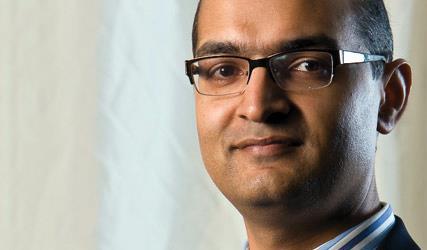A pioneer of patient access to records, Amir Hannan’s practice was one of the first ones in the country to offer its patients access to their full GP electronic health records. He talks to Shreshtha Trivedi about the current state of the NHS and its future

Amir Hannan
Amir Hannan is a full-time GP at Haughton Thornley Medical Centres in Hyde, information management and technology lead at Tameside and Glossop Clinical Commissioning Group and a founding member of the Records Access Collaborative.
Why did you choose to work in healthcare?
I grew up in a family of doctors – my mother was a gynaecologist who later became a GP, working alongside my father. I always wanted to help others but also had an interest in IT so I could have gone into either sector.
‘The NHS itself is an innovation and continues to adapt to a rapidly changing environment’
Ultimately I decided IT was simply a tool whereas being a doctor means entering people’s lives and journeying with them. That makes it more real, more enjoyable and also more fun!
Who in the healthcare sector inspire you most?
As I spend most of my time with patients, they have been the most inspiring for me, especially when they have managed to overcome disability, ill health or faced up to the risks ahead. Margaret Rickson, Yvonne Bennett, Ingrid Brindle are just a few names but I could, literally, mention thousands.
I work in a very deprived neighbourhood and yet there are so many inspiring people all around me who have done so much with so little.
Together with these, a number of health professionals have also inspired me. These include Dr Richard Fitton, who is the most profound clinician/thinker/leader I have come across. His ideas around working with patients have helped me to think more broadly. Dr Andrew Coley and Dr Raj Kumar helped solidify this later via the Clinical Leaders Network.
Dr Asad Sadiq, Bibhas Roy and Dr Rhidian Bramley within the Health Informatics Clinical Advisory Team opened my mind to very many different perspectives from other parts of healthcare, and Jacqueline Gladwin, a senior lecturer in nursing, has made remarkable changes in the nursing curriculum to prepare the next generation of nurses.
Finally Glen Griffiths and Dr Richard Sills must be mentioned for their determination to continue to stand for what is important, to remain principled and true to their values, and for keeping their focus on quality and patient care first and foremost.
Innovation to you is…
About doing or making something completely new that has never been done before, which leads to a material change in thinking, behaviour or outcomes.
Do you think the NHS is slow to adopt innovation?
Yes and no. Yes because it seems to take an eternity to get anything done and scaling things still seems to elude us. But no because we are still world leaders and first to market in many areas. The NHS itself is an innovation and continues to adapt to a rapidly changing environment.
‘We need to create strong opportunities for innovators to engage with clinical, managerial and patient leads’
What can be done to encourage more innovation in healthcare and the NHS?
We need open transparent funding schemes that can support innovation and are centred around patients, their families and supporting their needs. The focus should be on safety and continuous improvement.
We need to create strong opportunities for innovators to engage with clinical, managerial and patient leads who can not only help, but also assess and support development at local, regional and national levels.
Researchers and the newly established academic health science networks can provide a breeding ground for ideas to spread at scale across a wider population and inform others. Every person,department, healthcare establishment and others (such as the voluntary sector) should be involved at some level of innovation, be that testing, using or offering post-implementation advice. It should become everybody’s business.
If you were given the freedom to introduce one innovative practice, scheme or idea in the NHS, what would that be?
I would identify local clinical, managerial and patient champions who are willing to trust each other as equal partners and encourage them to set a local agenda to discuss issues at a local level with fellow colleagues. In this way they could determine priorities and local funding arrangements.
Start small, build confidence and develop respect, improved outcomes and value through engagement, local discussion and debate and delivering results.
What do you think is the biggest challenge faced by the NHS and the healthcare system?
To reinvent itself to be fit for purpose in an increasingly uncertain world, with an ageing population who have multiple comorbidities. All staff must be focused on improving patient care for all.
What are your thoughts on open data access regarding patient confidentiality?
The real issue is about patient, managerial and clincial empowerment at a local level, supported by national or regional structures.
Patients and data controllers need to be put in charge of who has access to their data and need to have the ability to view the audit trail to see who has had access and when. That’s different to open data and strengthens patients’ rights to confidentiality while supporting data controllers’ rights to protect data.
What can be done to make the NHS more patient focused?
Ensuring there is an equally strong patient leadership and, hence, engagement at all levels of decision making and sharing. Incentives and disincentives help.
Having examples to showcase patient-focused care will also help. Highlighting successes as well as mistakes or poor practice so we can all learn is also important.
Local leaders should be encouraged to identify new patient leaders who can help them and foster the necessary skills and abilities to fast-track the new ways of working and teams we need to overcome some of the biggest challenges faced by the NHS.























No comments yet